Chaque année, l’ACMV rend fièrement hommage aux médecins vétérinaires, aux équipes vétérinaires, et aux étudiants et étudiantes en médecine vétérinaire pour leur contribution exceptionnelle à la profession et à la médecine vétérinaire. Les prix de l’ACMV de 2025 seront remis lors du Gala de remise des prix le mercredi 25 juin 2025 dans le cadre du Congrès annuel de l’ACMV qui aura lieu à Victoria, en Colombie-Britannique.
La période de nomination est maintenant terminée.
Découvrez quelques moments forts du gala de remise des prix de l’année dernière. Nous avons hâte d'accueillir à Victoria, en Colombie-Britannique, les personnes lauréates des prix 2025 et les personnes qui les accompagneront.
Anciens récipiendaires des prix de l'ACMV
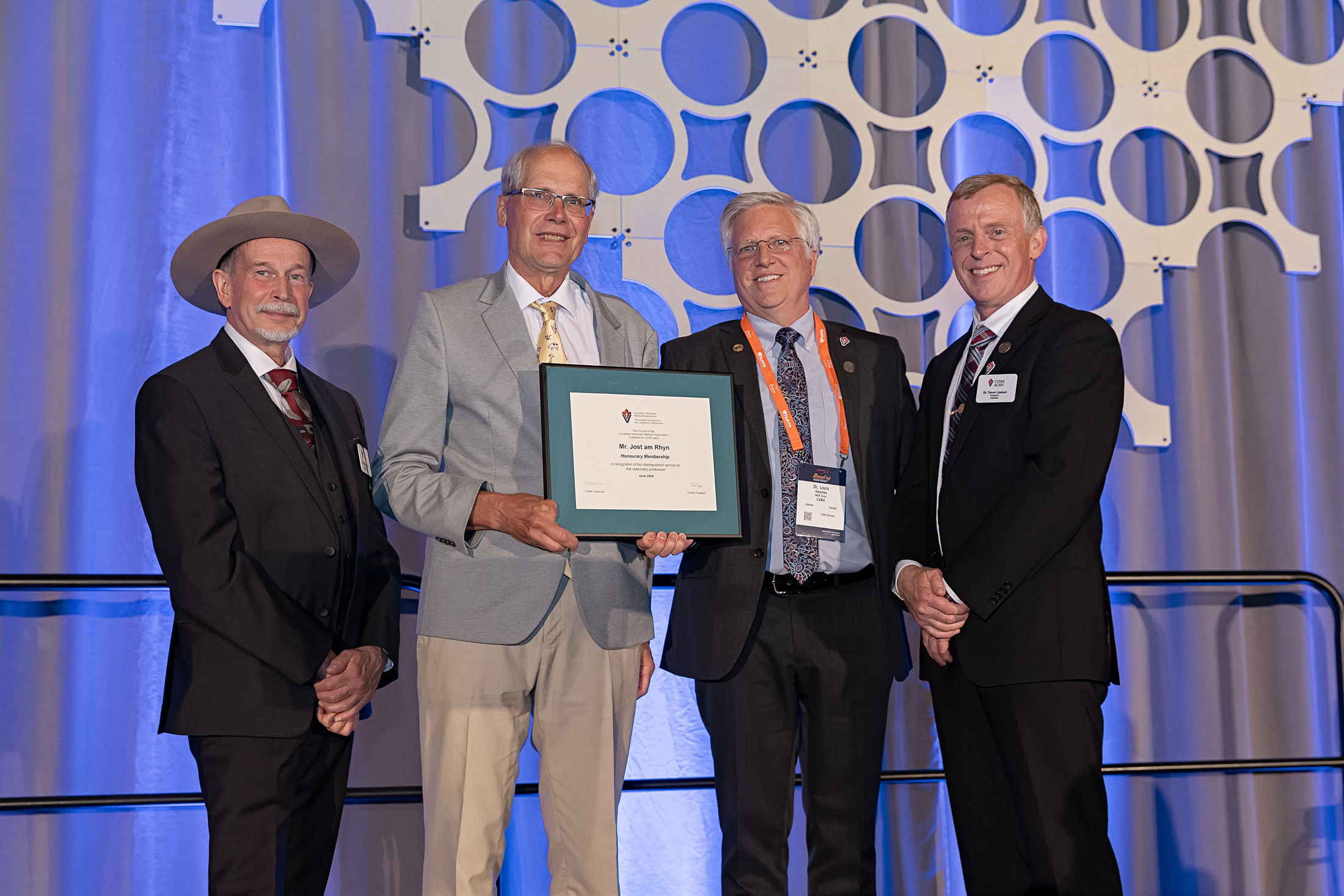
Récipiendaire de 2024 :
M. Jost am Rhyn
Jost am Rhyn, diplômé en administration des affaires et en économie, a apporté une riche expérience à ses fonctions au sein de l'ACMV. Son leadership est bien établi avec 38 années d'expérience dans des postes de direction au sein d'organisations nationales à but non lucratif en Suisse et au Canada. Il a notamment consacré plus de 21 ans à titre de PDG de l'ACMV et de registraire du Bureau national des examinateurs. Il est décrit comme un leader éminent de la profession vétérinaire canadienne, guidant l'ACMV à travers de nombreux changements dans le paysage vétérinaire tout au long de son mandat de PDG.
Le Prix humanitaire de l’ACMV, créé en 1986 et commandité par Merck Santé animale, reconnaît le leadership dans le domaine des soins aux animaux et du bien-être animal. Ce prix est présenté à un membre de l’ACMV dont le travail est réputé avoir grandement contribué au bien-être des animaux. Les récipiendaires reçoivent une bourse de 1000 $.
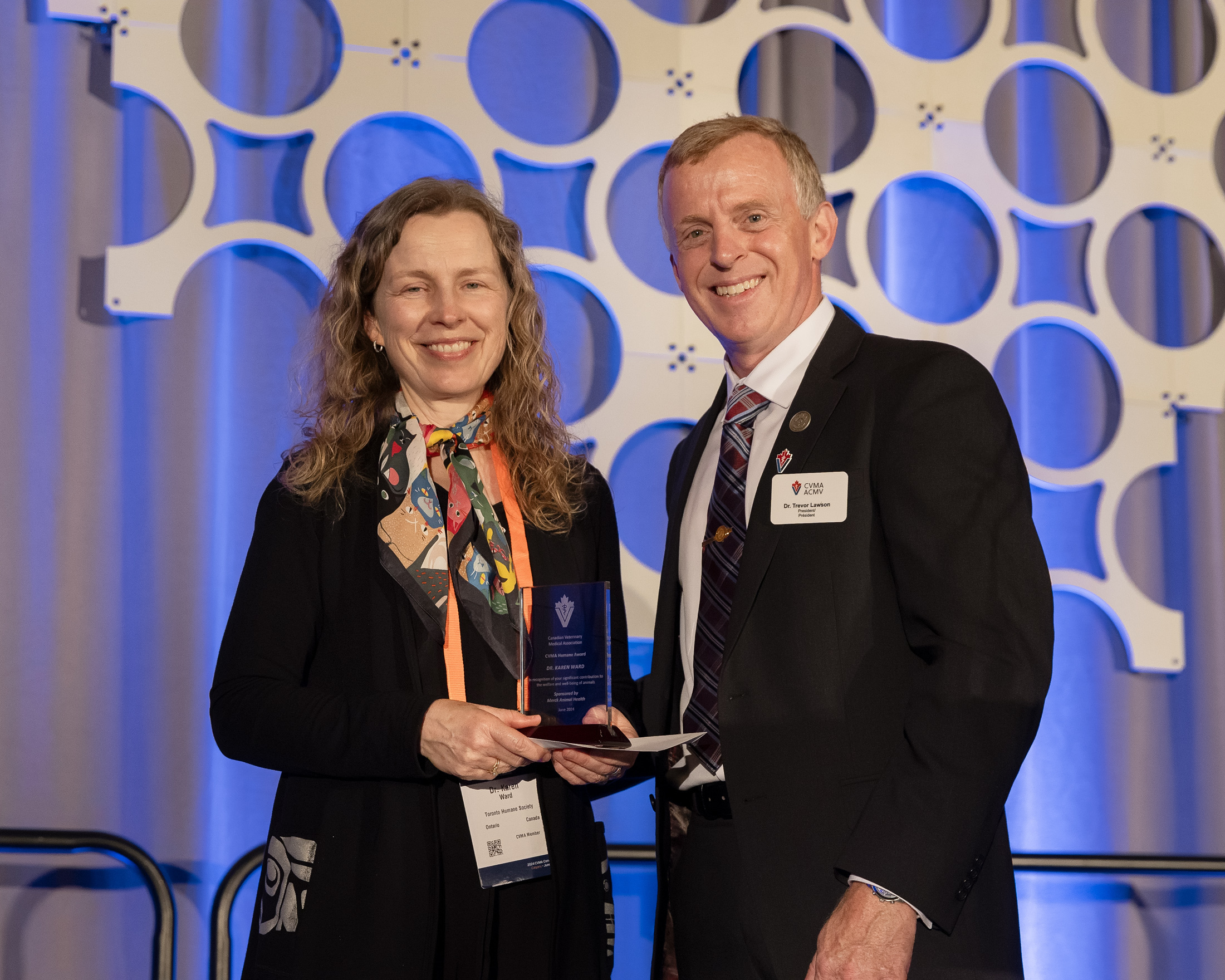
Récipiendaire de 2024 :
Dre Karen Ward

La Dre Karen Ward est diplômée en 1990 de l’Ontario Veterinary College. Son travail clinique comprend des cliniques communautaires de bien-être et de chirurgie, offrant des soins vétérinaires accessibles aux Premières Nations et aux communautés urbaines mal desservies en collaboration avec des partenaires communautaires. Elle a contribué à identifier le ver du cœur comme une maladie socio-économique et a publié des protocoles de traitement alternatifs accessibles, sûrs et efficaces. Elle est actuellement vétérinaire en chef de la Toronto Humane Society, où elle donne généreusement de son temps en tant que pair-conseillère et contribue au Comité de référence vétérinaire communautaire aux côtés du College of Veterinarians of Ontario.
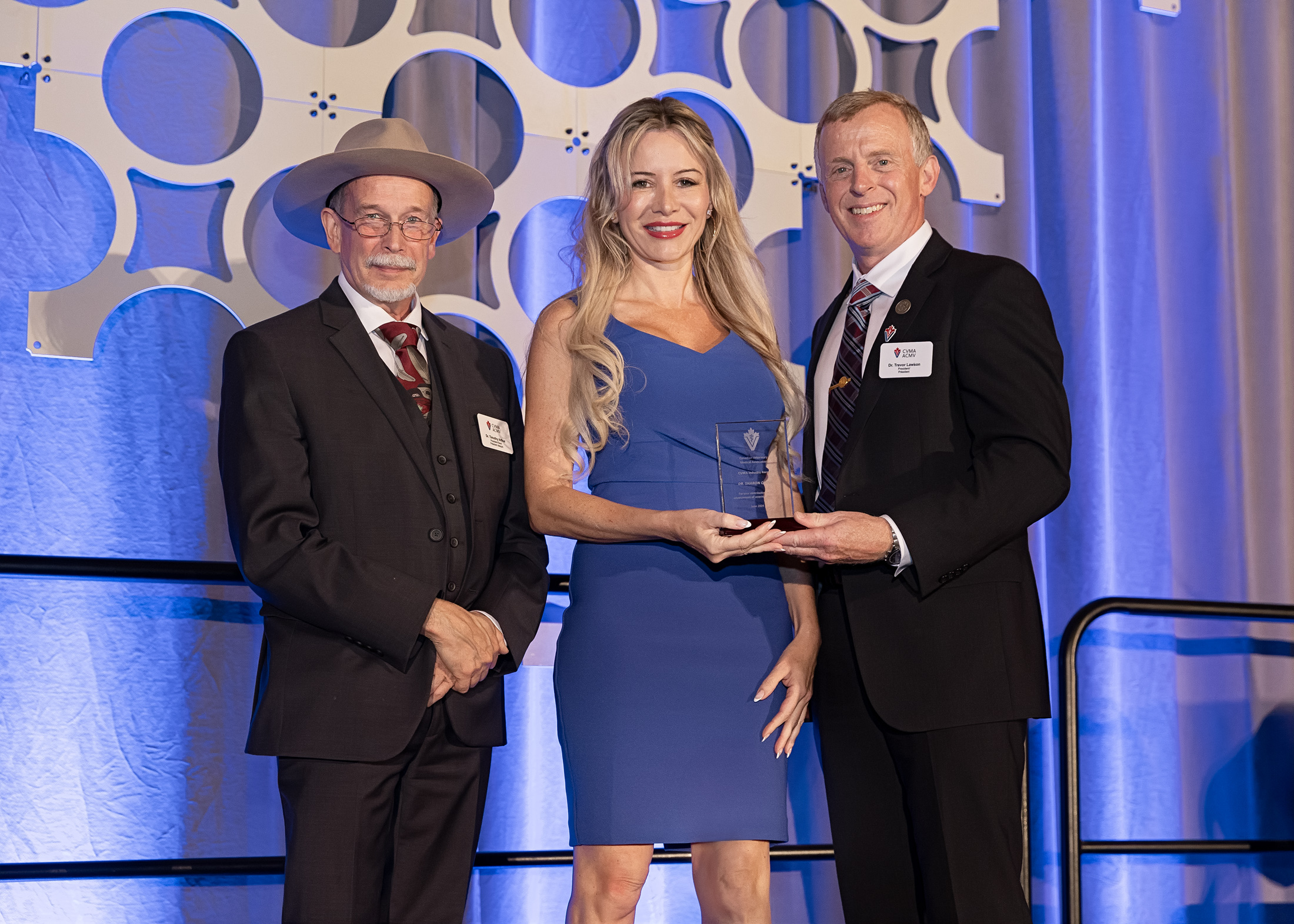
Récipiendaire de 2024 :
Dre Sharon Quinn
La Dre Sharon Quinn est diplômée du Ontario Veterinary College en 2004 et a cofondé Smart.Vet, un fournisseur de logiciels et de services de télémédecine vétérinaire qui travaille avec les hôpitaux pour fournir un accès à des solutions de soins tout en allégeant la pression sur les équipes surchargées et en améliorant l’équilibre vie professionnelle-vie familiale pour les professionnels vétérinaires. Depuis sa première année en 2020, elle s'implique également auprès de la Veterinary Virtual Care Association, siégeant actuellement au conseil d'administration et présidant le comité canadien. Récemment, elle a fondé un hôpital pour animaux de compagnie à Waterdown, en Ontario, qui adopte une approche innovante en matière de conception hospitalière et intègre la technologie dans la prestation des soins. Elle est la fière mère de quatre enfants; son aîné est diplômé en commerce de l'Université de Toronto et cofondateur de Smart.Vet.
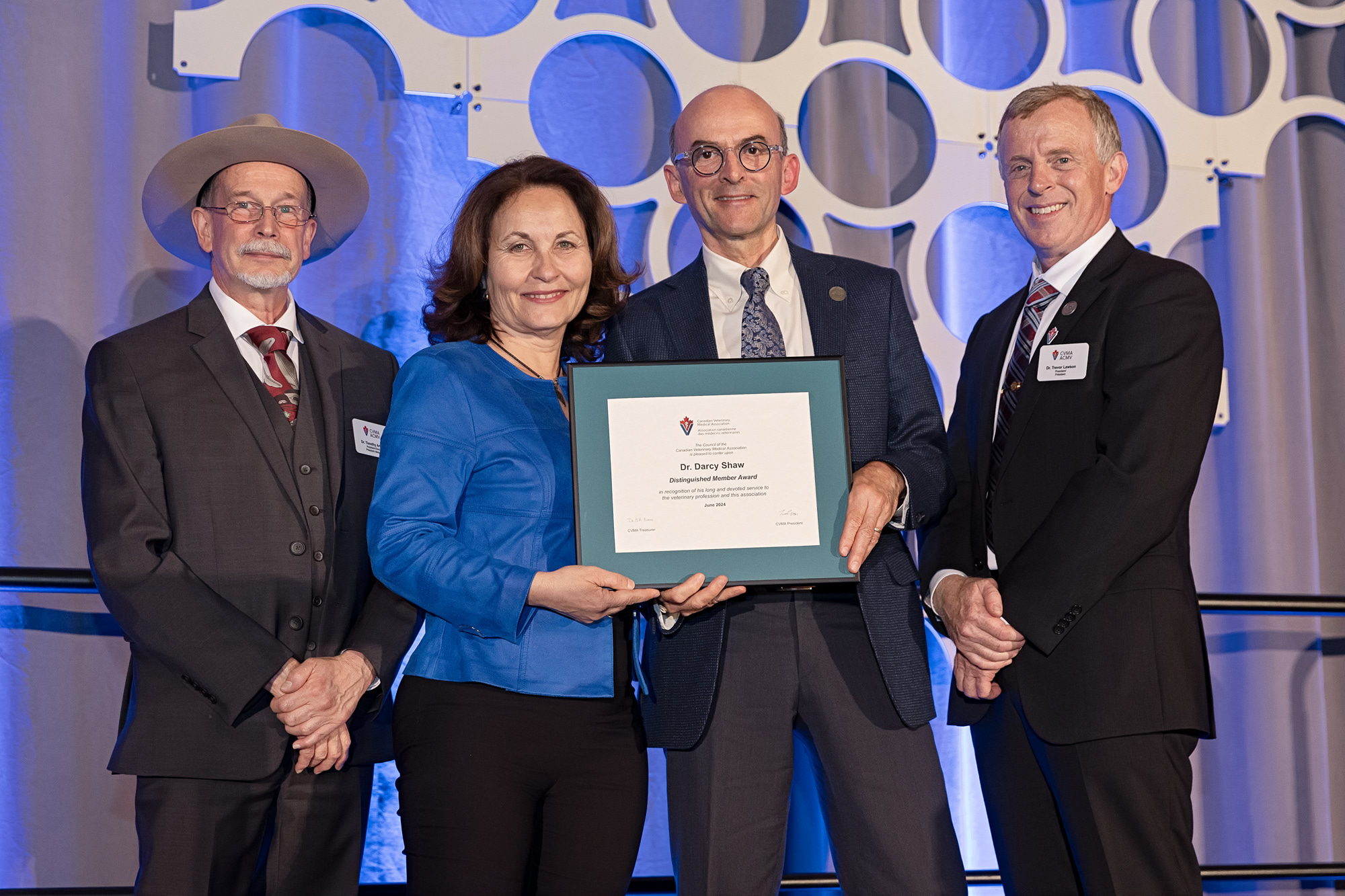
Récipiendaire de 2024 :
Dr Darcy Shaw
Originaire de Moose Jaw, en Saskatchewan, le Dr Darcy Shaw a obtenu son diplôme avec distinction du Western College of Veterinary Medicine en 1983. Après deux ans de pratique privée, il est retourné au WCVM pour terminer une résidence et un programme d'études supérieures en médecine interne des petits animaux. Il est Diplomate de l’American College of Veterinary Internal Medicine et professeur émérite de médecine interne des petits animaux au Département des animaux de compagnie de l’Atlantic Veterinary College. Le Dr Shaw a aidé à établir le programme d'enseignement des compétences en communication à l'AVC et continue de contribuer à plusieurs cours. Au cours de sa carrière, il a développé une profonde appréciation pour le dévouement et la passion des membres de la communauté vétérinaire ainsi que pour le besoin impérieux de se soutenir mutuellement, de communiquer efficacement et de diriger avec intégrité. Le Dr Shaw a été président de l'ACMV en 2000 et 2001 et membre du conseil d'administration du Veterinary Leadership Institute de 2014 à 2022.
Créé en 2013, le Prix de la pratique de l’année de l’ACMV est parrainé par la Banque Scotia, chef de file des services bancaires pour les professionnels. Ce prix récompense l’équipe d’une pratique vétérinaire pour ses réalisations exceptionnelles au sein de sa communauté locale. Les récipiendaires reçoivent une bourse de 1500 $.
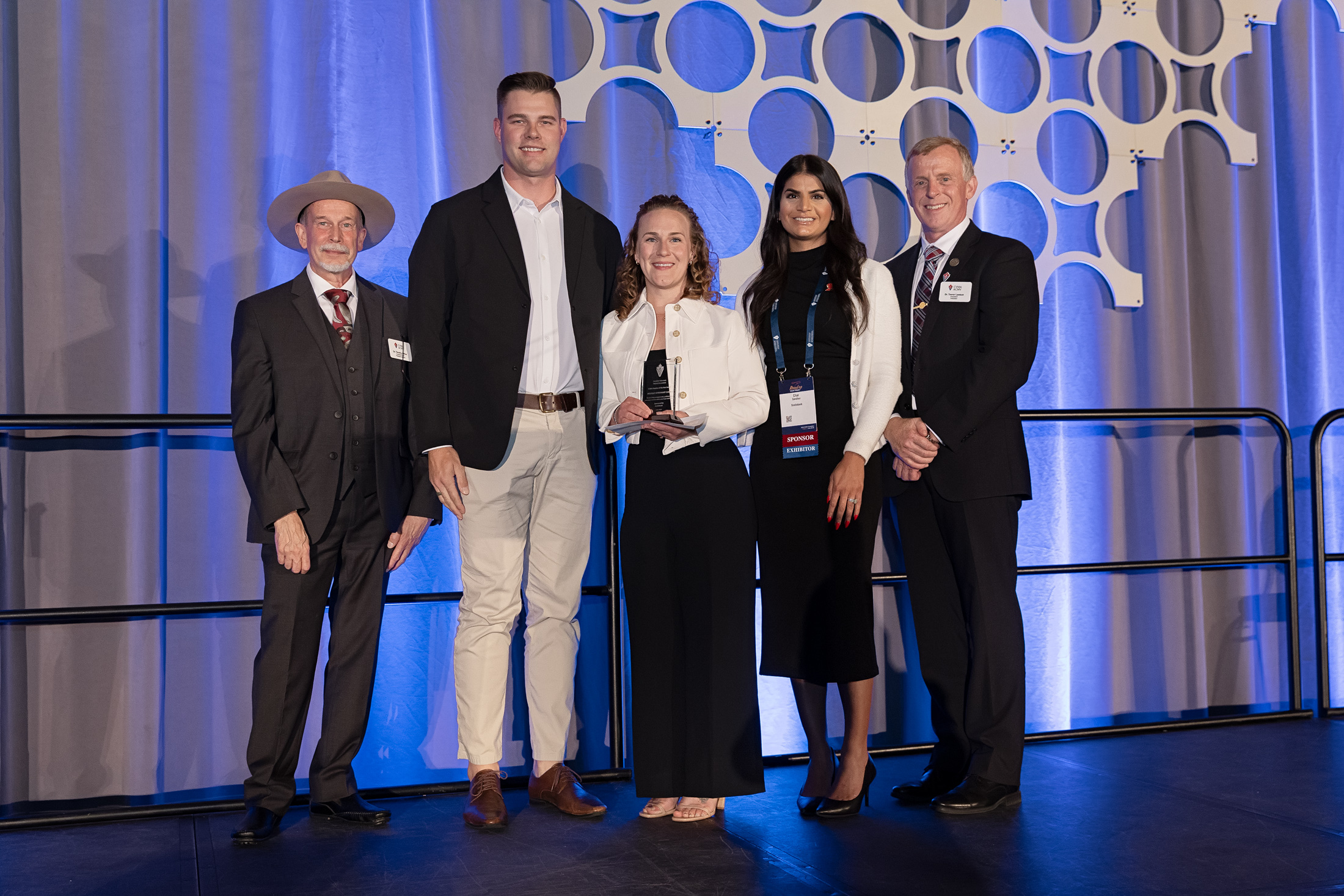
Récipiendaire de 2024 :
Melville Veterinary Clinic
![]()
La clinique vétérinaire Melville est accréditée par l'American Animal Hospital Association et dessert le centre-est de la Saskatchewan. L'équipe, composée de cinq vétérinaires, de sept techniciens vétérinaires agréés et de quatre membres de personnel de soutien, se consacre à fournir des soins vétérinaires progressifs et compatissants. Ils sont passionnés par l’offre de mentorat et d’un environnement d’apprentissage positif au personnel et aux étudiants intéressés par la pratique mixte des animaux. Ils ont accueilli de nombreux étudiants vétérinaires, techniciens et assistants-vétérinaires lors de leurs stages et externats, dont plusieurs ont choisi de se joindre à l'équipe. Ils sont particulièrement fiers d'offrir des cliniques de vaccination et des programmes de stérilisation avec les communautés locales des Premières Nations de Cowessess pour aider à réduire les obstacles à des soins vétérinaires abordables.
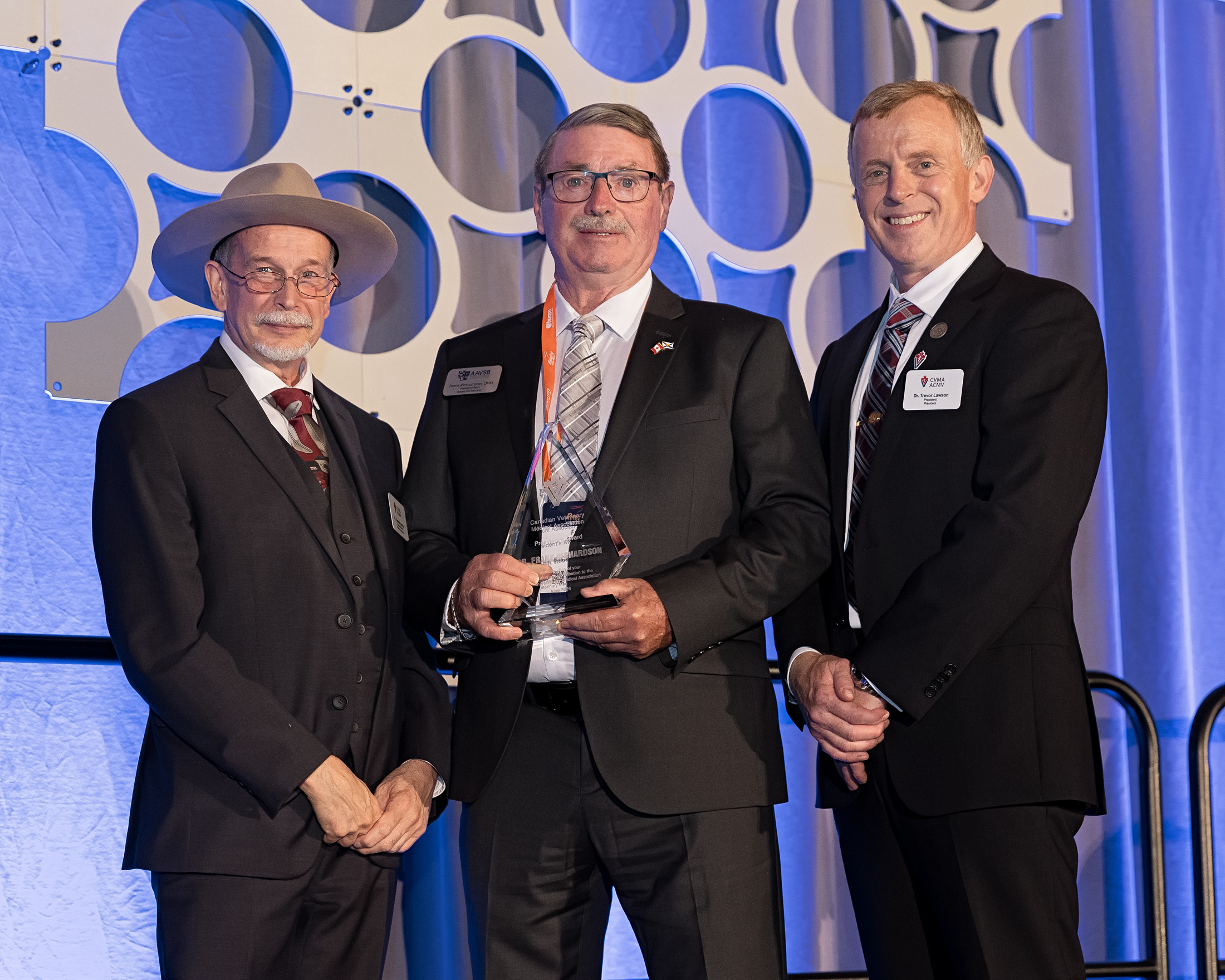
Récipiendaire de 2024 :
Dr Frank Richardson
Le Dr Frank Richardson a grandi à Quispamsis, au Nouveau-Brunswick, et a réalisé son rêve de jeunesse à devenir vétérinaire lorsqu'il a obtenu son diplôme en 1976 au Ontario Veterinary College. Il a passé la majeure partie de sa carrière professionnelle dans le domaine de la médecine et de la chirurgie des petits animaux en Nouvelle-Écosse, où il a ouvert le Richardson Animal Hospital en 1990. Après avoir obtenu une maîtrise en 1999, il a ouvert Practice One Consulting pour fournir des évaluations et des services de conseil aux vétérinaires de Canada. Reconnu internationalement pour son intérêt pour la réglementation vétérinaire et continuant d'exercer à temps plein, il a été registraire de la Nova Scotia Veterinary Medical Association de 1990 à 2022. Il est actuellement président élu de l'American Association of Veterinary State Boards et, en septembre, il deviendra la première personne canadienne à présider l'AAVSB. Le Dr Richardson est un fervent partisan de l'ACMV, ayant assisté à tous les congrès de l'ACMV depuis 1976 et siégé à de nombreux comités de l'ACMV.
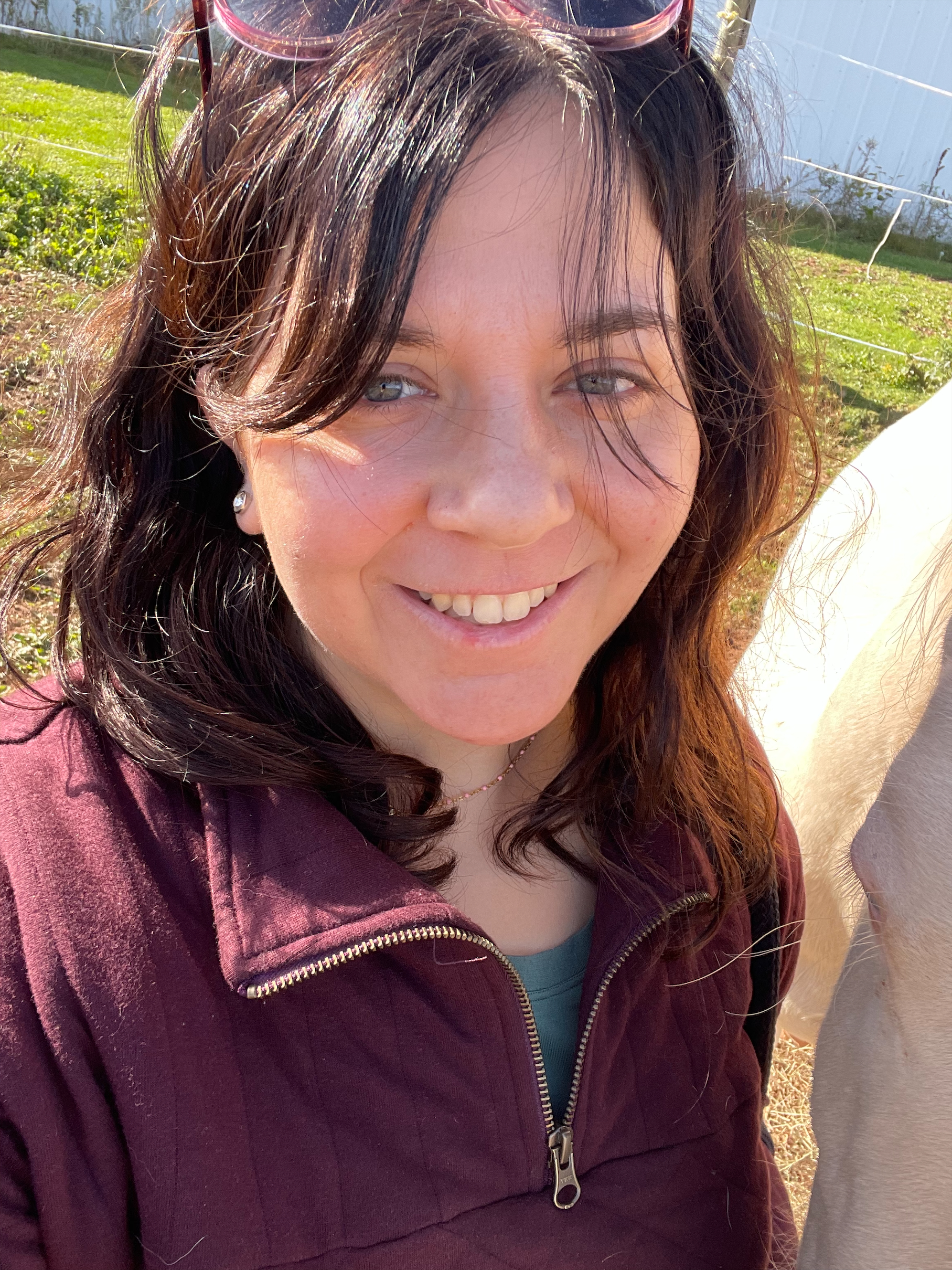
Jamye MacWilliam
Jamye MacWilliam est étudiante en quatrième année à l’Atlantic Veterinary College (AVC). Elle s’implique activement dans les activités de la communauté étudiante depuis sa première année à l’AVC et est très reconnaissante à ses camarades de classe de l’avoir choisie pour ce prix.
Jamye est née à Montréal, mais elle vit à l’Île-du-Prince-Édouard depuis 11 ans. Elle a développé son éthique de travail et ses compétences en leadership au sein d’un organisme sans but lucratif appelé Parkside Ranch, à Orford, au Québec, où son amour pour les chevaux et la médecine vétérinaire s’est développé. Elle y a appris à diriger avec cœur et ouverture d’esprit, ce qu’elle a continué de faire chaque fois qu’elle a été appelée à jouer un rôle de leader.
Avant d’entreprendre ses études en médecine vétérinaire, Jamye a obtenu un baccalauréat en biologie de l’environnement à l’Université de l’Île-du-Prince-Édouard et une maîtrise en gestion de la santé à l’AVC. Elle est heureuse de faire partie de la promotion de 2024 et reconnaissante d’avoir côtoyé autant de personnes merveilleuses, gentilles et compétentes dans sa cohorte. Elle a eu le privilège de s’impliquer dans la communauté très unie de l’AVC en étant présidente de la Society of Atlantic Veterinary Students et en participant au comité exécutif de sa classe et à d’autres clubs.
Jamye prévoit de pratiquer la médecine des grands animaux après l’obtention de son diplôme. Pendant ses temps libres, elle aime entraîner son cheval, faire de la randonnée avec son chien, et cuisiner.
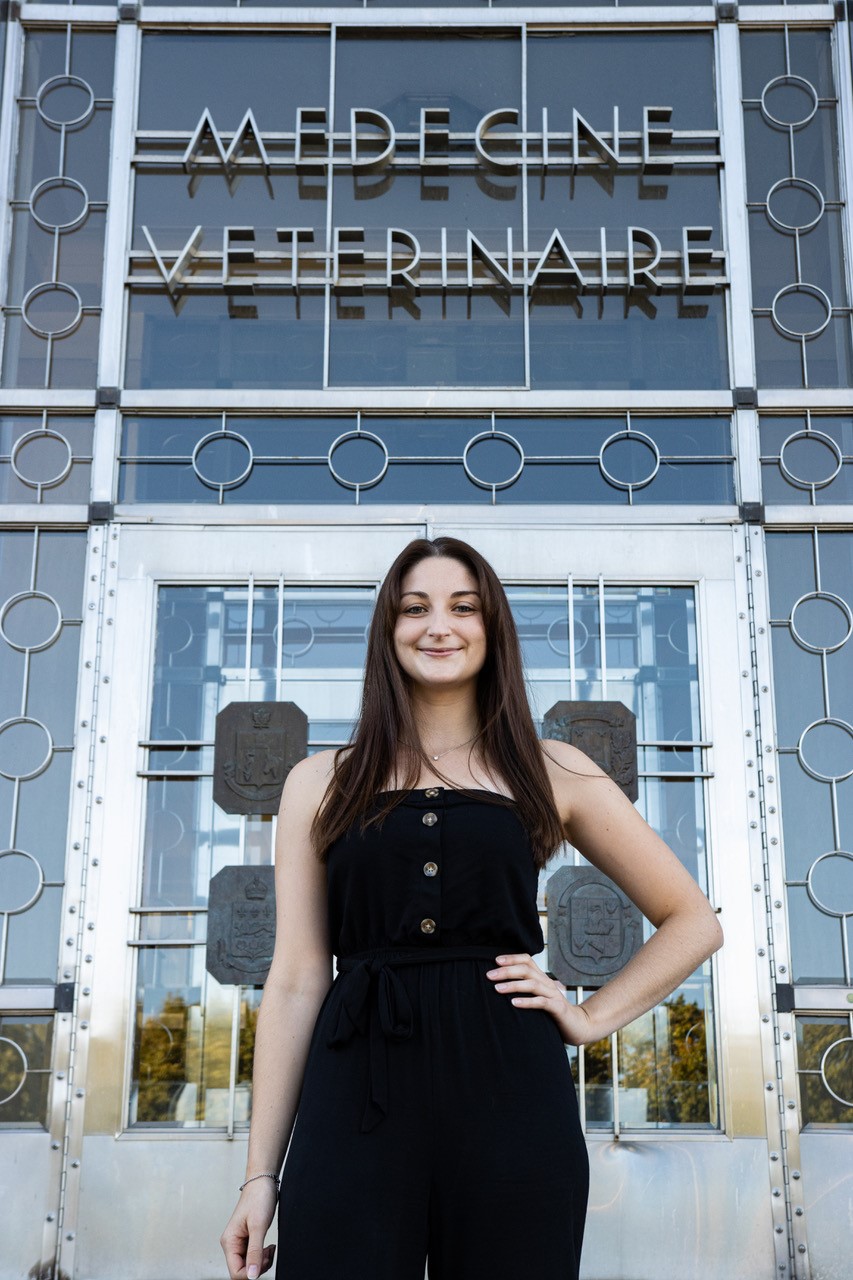
Frédérique Massicotte
Frédérique Massicotte est déléguée académique et représentante de la cohorte des 3e année à la Faculté de médecine vétérinaire de l’Université de Montréal (FMV) , et se sent privilégiée de travailler avec les étudiants et les membres de l'association étudiante!
Frédérique est toujours à l'écoute de ses collègues, qui lui font confiance pour faire valoir leurs avis et idées auprès de la communauté enseignante et de l'association étudiante.
Elle est également co-présidente du Comité Étudiante du Bien-Être Animal (CEBA), où elle s'est beaucoup investie dans le développement de nombreux projets depuis 2020 pour relancer ce comité qui lui tient à cœur.
Frédérique a travaillé intensivement sur un projet de parrainage étudiants-chiens d’enseignement pour permettre aux beagles de bénéficier d’une vie plus stimulante, et ils travaillent actuellement sur un programme à long terme d'activités d'enrichissement pour chacune des espèces animales de la faculté.
Son implication démontre beaucoup de leadership, surtout au sein de sa cohorte et du CEBA, ce qui implique d'être capable de trouver de nouvelles idées et de s'assurer que tout le monde puisse s’exprimer sur chaque proposition. Elle est extrêmement impliquée dans sa classe et dans la vie étudiante, y consacrant plusieurs heures par semaine tout au long de l'année scolaire, ce qui, selon elle, en vaut la peine car les étudiants l'apprécient!
Frédérique tient à remercier l'ACMV pour ce prix généreux. Le Prix du leadership étudiant de l'ACMV représente un véritable coup de pouce pour elle et lui donne envie de continuer à s'impliquer dans la communauté étudiante !
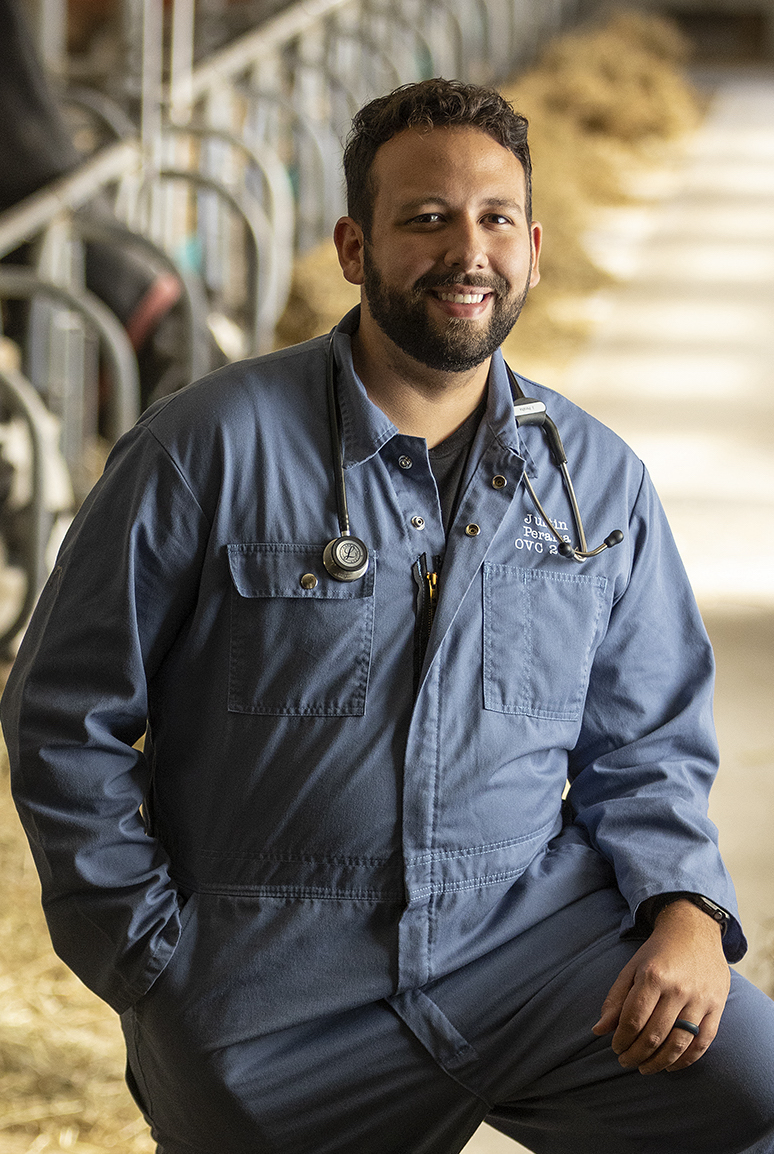
Justin Peralta
Justin Peralta est étudiant en quatrième année à l’Ontario Veterinary College (OVC) et coprésident de sa promotion. La camaraderie entre pairs est une priorité pour lui, et ses principaux objectifs en tant que coprésident ont toujours été de promouvoir l’inclusion et d’être la voix de ses confrères et consœurs de classe.
Au cours des deux dernières années, il a fait du bénévolat dans le cadre du Kim and Stu Lang Community Healthcare Partnership Program (CHPP) et participé à des événements qui facilitent l’accès aux soins dans des communautés historiquement moins bien desservies.
Justin est extrêmement honoré d’avoir été choisi par ses collègues étudiants pour recevoir un prix soulignant son leadership. Pendant son passage à l’OVC, il a aussi reçu le Spirit Prize de l’OVCAA et l’OVC 1996 Legacy Scolarship, deux prix décernés par un vote des pairs pour récompenser un de leurs camarades qui fait preuve de leadership et qui s’implique au sein de sa cohorte.
Après l’obtention de son diplôme en avril, Justin envisage de faire carrière en pratique des petits animaux, en se concentrant sur les soins primaires et la médecine communautaire. Il a hâte de pouvoir offrir des soins vétérinaires à tous les membres de sa future communauté. Il est passionné par la représentation et la prestation d’un large éventail de soins.
Justin souhaite utiliser ce qu’il a appris jusqu’à présent pour aider à combler des lacunes en matière d’accès aux soins vétérinaires.
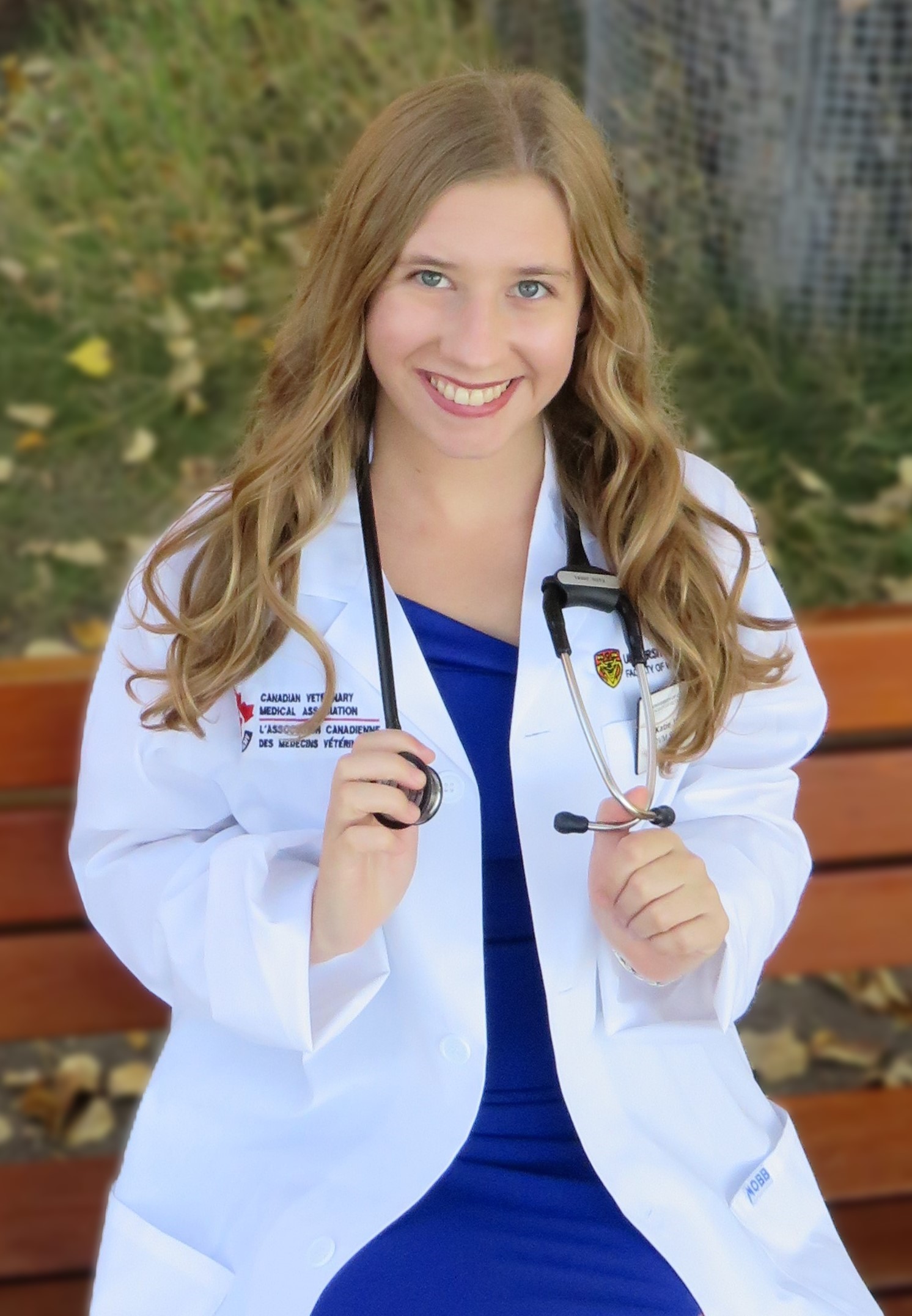
Katie Jones
Katie Jones est étudiante en troisième année à la Faculty of Veterinary Medicine de l’Université de Calgary (UCVM). Elle est passionnée par le leadership et souhaite jouer un rôle actif et positif au sein de sa communauté.
Katie a obtenu un baccalauréat en biologie de l’Université de Calgary en 2021, dans le cadre duquel elle a suivi un programme d’études à l’étranger en partenariat avec l’Université de technologie du Queensland à Brisbane, en Australie, et elle a rédigé une thèse de recherche sur la génétique du saumon coho. Faisant maintenant partie de la promotion de 2025 de l’UCVM, elle a été élue présidente de classe ces trois dernières années et elle est membre du comité exécutif de nombreux clubs, dont le Small Animal Club et l’Ecosystem and Public Health Club.
Katie aime participer à des activités d’éducation et de sensibilisation, notamment au Stampede de Calgary et aux journées portes ouvertes de l’Université de Calgary, pour aider à établir des liens avec des personnes intéressées par la médecine vétérinaire. Elle cherche constamment des occasions d’approfondir son apprentissage clinique, notamment en travaillant dans un centre d’urgence et de référence pour petits animaux, en faisant du bénévolat dans des cliniques de stérilisation et de protection de la faune, et en participant à des programmes de stages dans de nombreuses spécialités.
Après l’obtention de son diplôme, elle souhaite effectuer un internat en rotation en médecine et chirurgie des animaux de compagnie, et elle espère que sa carrière de vétérinaire l’amènera à parcourir le monde pour aider les communautés, les animaux et la faune locale partout où elle ira. Ses champs d’intérêt sont variés et elle est enthousiaste à l’idée d’explorer divers domaines de pratique.
En dehors de la médecine vétérinaire, Katie aime faire des voyages, de l’équitation, de la plongée sous-marine, de l’art dramatique, et de la randonnée dans les magnifiques montagnes Rocheuses. Katie est reconnaissante à sa famille et à ses pairs de l’avoir soutenue dans ses initiatives de leadership et elle remercie sincèrement ses camarades et l’ACMV de lui avoir décerné ce prix.
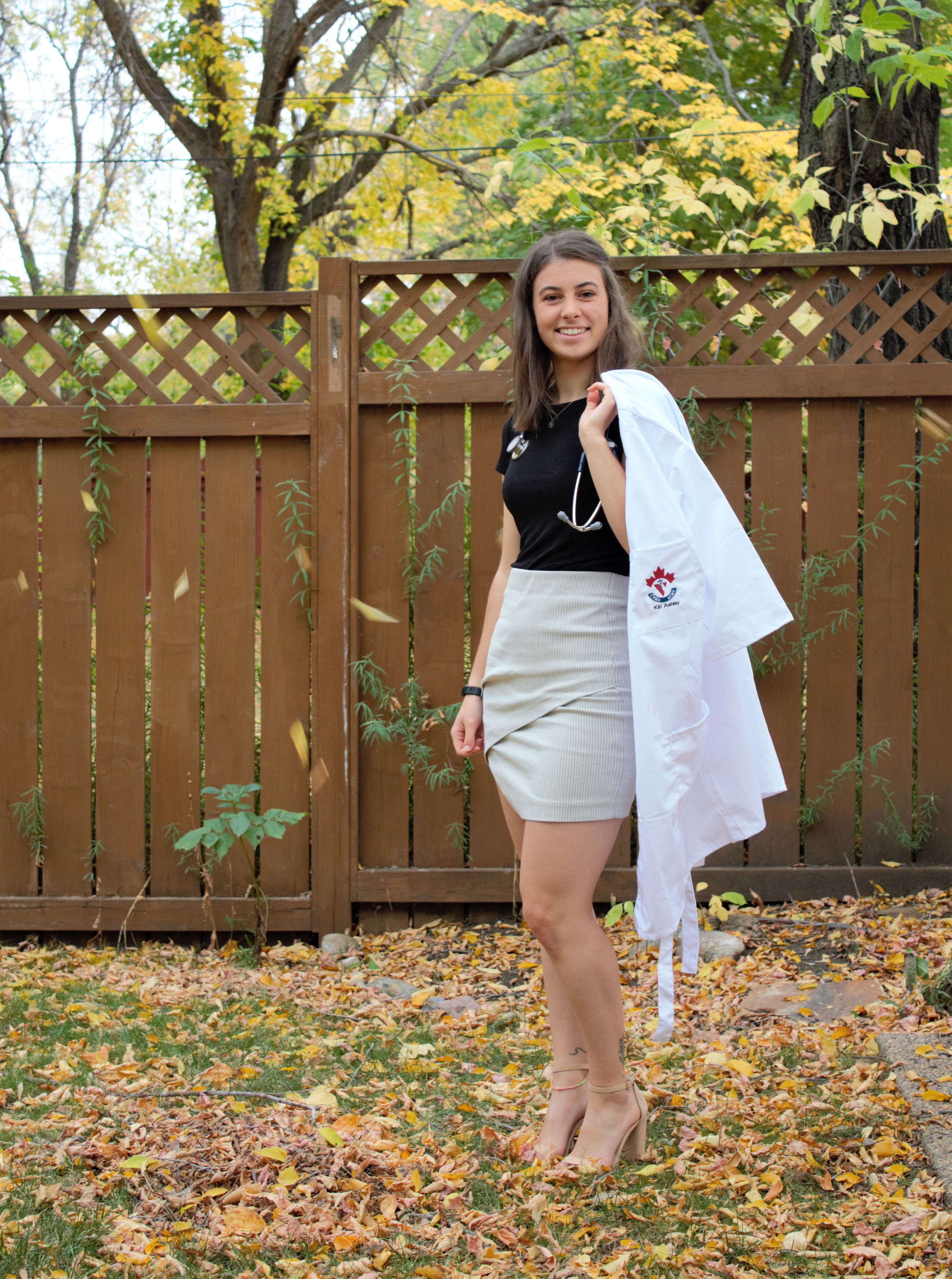
Kiri Stephenson
Kiri Stephenson est étudiante en quatrième année au Western College of Veterinary Medicine (WCVM) à Saskatoon, en Saskatchewan. Elle est originaire de Yellowknife, dans les Territoires du Nord-Ouest, mais a obtenu son baccalauréat en sciences à l’Université de la Colombie-Britannique, à Vancouver. Dès son âge dans le Nord, elle s’est impliquée dans la représentation étudiante à l’intérieur et à l’extérieur de l’école au sein de diverses organisations, et cela s’est poursuivi durant son parcours au WCVM.
Kiri se sent plus à l’aise dans des rôles de liaison. Elle est représentante de la promotion de 2024 au sein du Student-Teacher Educational Progress Committee, et elle a été la représentante des étudiants au sein du Curriculum Committee au cours de la dernière année. Elle est également l’une des ambassadrices en matière de développement durable pour sa cohorte et a participé en tant que membre du comité exécutif et organisatrice à la journée portes ouvertes « Vetavision » du WCVM et de la Western Canadian Veterinary Students’ Association. Elle a aussi fait partie du comité exécutif du Production Animal Club et de la Wildlife Disease Association du WCVM durant plusieurs années.
Lorsqu’elle n’est pas occupée par ses études et ses activités de représentation, Kiri est gardienne de but pour l’équipe féminine de hockey récréatif du WCVM, deux fois championne de sa division à l’Université de la Saskatchewan. Elle s’adonne également à d’autres activités physiques comme le cyclisme et la musculation, et elle aime tricoter et écouter des balados.
Kiri est enthousiaste à l’idée de commencer sa carrière de vétérinaire pour grands animaux dans le sud de la Colombie-Britannique après l’obtention de son diplôme, et entend continuer à représenter la communauté vétérinaire dans la mesure du possible. Elle est reconnaissante à ses camarades de classe du WCVM de l’avoir choisie pour le Prix du leadership étudiant de l’ACMV et est toujours ravie de les représenter et de les soutenir.
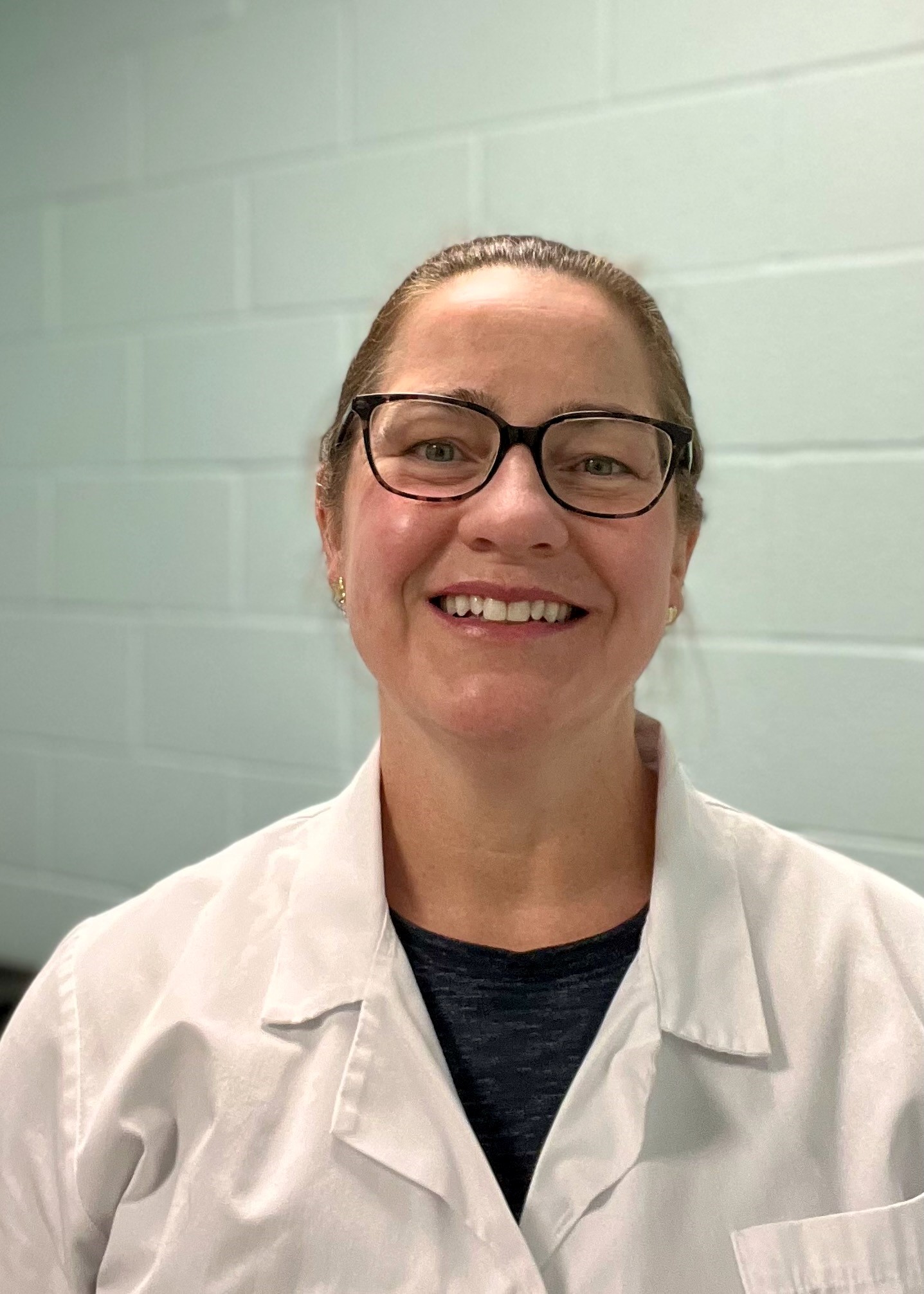
Dre Sheri Ross
La Dre Sheri Ross est professeure agrégée à l’Atlantic Veterinary College de l’Université de l’Île-du-Prince-Édouard. Membre de l’équipe de médecine interne des petits animaux, elle enseigne les cours et les laboratoires précliniques, tout en participant aux stages cliniques et à la formation aux études supérieures.
La Dre Ross a obtenu son diplôme de l’Atlantic Veterinary College en 1996, et elle a effectué un internat, une résidence en médecine interne et un doctorat en néphrologie et en urologie à l’Université du Minnesota. Après avoir été professeure adjointe en clinique au Minnesota, elle a entrepris en 2006 un programme de spécialité en médecine rénale et hémodialyse au Veterinary Medical Center de l’Université de Californie à San Diego. Elle est ensuite restée à l’UC Davis en tant que coordinatrice du programme de néphrologie/urologie et de traitements extracorporels. Elle est revenue à l’Atlantic Veterinary College en 2022, et est reconnaissante de pouvoir poursuivre sa passion pour l’enseignement et la formation clinique. La Dre Ross est membre fondatrice de l’American College of Veterinary Nephrology and Urology, membre du conseil d’administration de l’IRIS, et membre du corps professoral de l’Hemodialysis Academy. Ses passions sont l’enseignement, les chats et les reins!
Le conseil de la Dre Ross aux étudiants est le suivant : « Quand vous faites face à un problème clinique, mettez-vous en quête du pourquoi jusqu’à ce que vous trouviez une réponse. Et n’oubliez pas que “vous êtes plus braves que vous ne le croyez, plus forts que vous ne le paraissez, et plus intelligents que vous ne le pensez” comme le dit si bien notre ami Winnie l’ourson! »
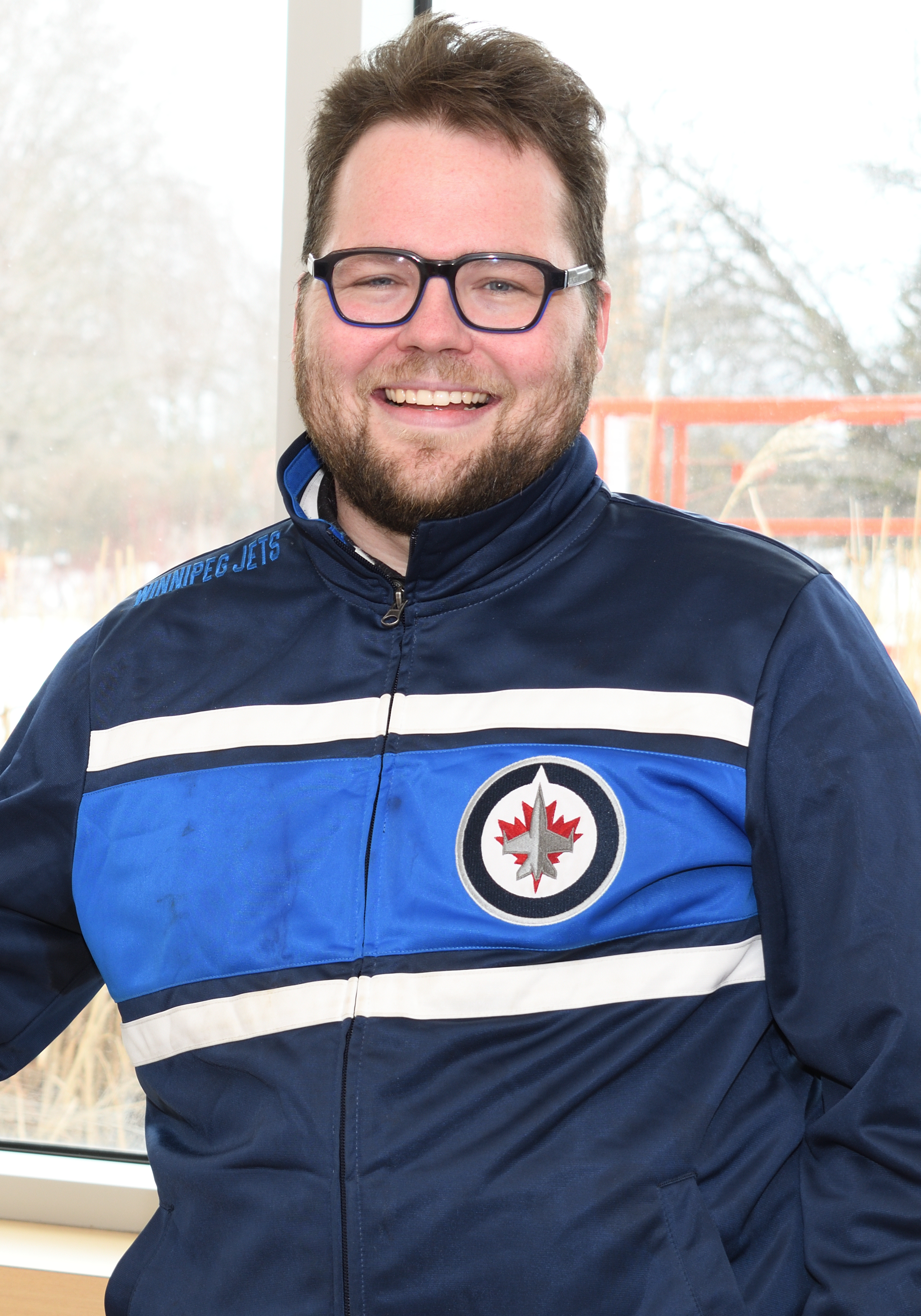
Dr Guillaume St-Jean
Le Dr Guillaume St-Jean a débuté ses études à la Faculté de médecine vétérinaire de l’Université de Montréal (FMV) en 2008. Tout au long de son parcours, il a développé un intérêt profond pour la pathologie vétérinaire.
En 2013, fraîchement diplômé de la FMV, il entame des études supérieures pour se spécialiser en pathologie vétérinaire à la FMV. Durant cette période, il découvre le plaisir de partager ses connaissances avec les étudiants au premier cycle. C'est à ce moment que s'est dessiné son désir de contribuer activement à la formation des futurs vétérinaires et chercheurs s'est concrétisé.
Le Dr St-Jean profite de cette période pour parfaire ses aptitudes en recherche en combinant son programme de résidence avec d'une maîtrise. Suite à la complétion de son programme de résidence et à la réussite de son examen de certification de l’American College of Veterinary Pathologists, il s'est orienté vers un doctorat à la FMV. Le Dr St-Jean a eu l'occasion de développer ses compétences et ses connaissances dans le domaine de la reproduction animale via l'étude de différents modèles transgéniques de souris et le rôle de certains gènes dans le développement de l'utérus.
À la fin de son doctorat, il a effectué un court passage dans une entreprise privée en toxicopathologie. Un an plus tard, à l'automne 2020, il s'est vu offrir l'opportunité de rejoindre la Faculté de médecine vétérinaire en tant que professeur assistant de pathologie anatomique vétérinaire. Ce fut un honneur pour lui de pouvoir redonner à cette institution qui lui a tant donné!
Depuis, le Dr St-Jean enseigne la pathologie vétérinaire (la plus belle discipline... selon lui...) aux étudiants. Il aspire, tout au long de sa carrière, à continuer à transmettre sa passion aux étudiants entrain, plaisir, écoute, disponibilité et humour. Tout pour leur faire découvrir l'importance de cette discipline.
Le conseil du Dr St-Jean aux étudiants est le suivant : « Je vous souhaite de retenir, telle une éponge, toutes les informations qui vous font vibrer intérieurement, et de vous fier à ces vibrations pour orienter votre parcours professionnel. Foncez ! Tentez ! N'ayez pas peur pour la suite, ni de l'échec ! Sans essai, il n'y a pas de réussite (parlez-en à des chercheurs qui font des demandes de subvention...). »
Un autre conseil amusant pour les étudiants : « Si vous êtes en pathologie, et que vous n'arrivez pas à reconnaître une structure... il y a de fortes chances qu'il s'agisse d'une structure du système reproducteur... »
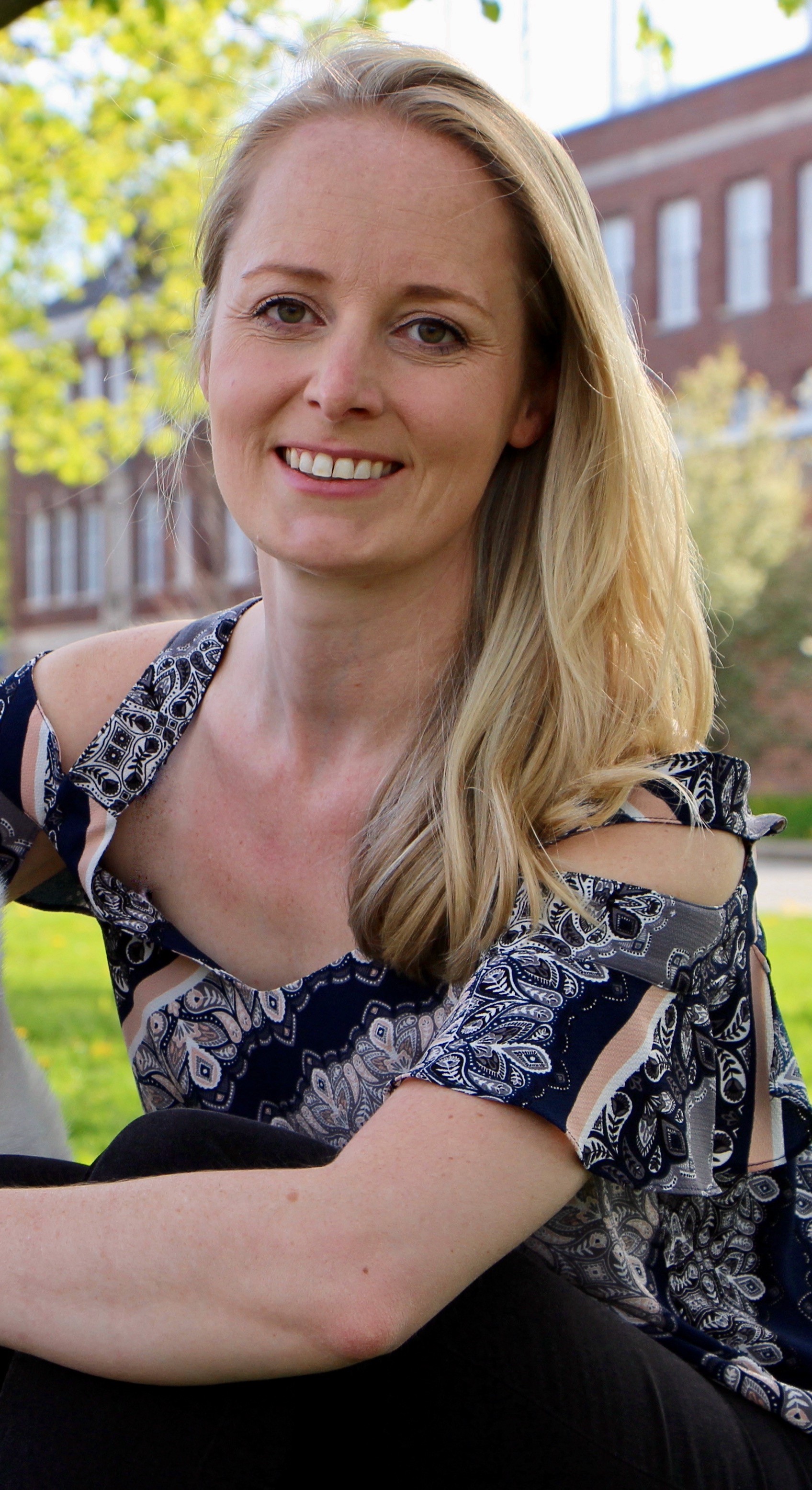
Dre Melissa MacIver
La Dre Melissa MacIver, professeure adjointe de chirurgie des petits animaux à l’Ontario Veterinary College (OVC), a obtenu son diplôme de l’OVC en 2013. Elle a effectué un internat en rotation en médecine et chirurgie des petits animaux au 404 Veterinary Emergency and Referral Hospital, suivi d’un internat en chirurgie des petits animaux à l’Université de Floride. Elle a ensuite effectué une résidence en chirurgie des petits animaux et une maîtrise sur la thérapie par les cellules souches à l’Université A&M du Texas. Elle a obtenu sa certification de spécialiste de l’American College of Veterinary Surgeons en 2020. La Dre MacIver a été embauchée à l’OVC en tant que professeure adjointe à l’automne 2019. Elle s’intéresse principalement à la chirurgie orthopédique, à la chirurgie minimalement invasive et à la thérapie par les cellules souches. L’enseignement a toujours été une de ses passions – voir ses étudiants gagner en confiance et pratiquer des chirurgies de stérilisation est pour elle une expérience extrêmement gratifiante.
Le conseil de la Dre MacIver aux étudiants est le suivant : « Il faut toujours continuer à apprendre et garder l’esprit ouvert. Restez positif et souvenez-vous que chaque fois qu’une porte se ferme, une autre porte s’ouvre. »
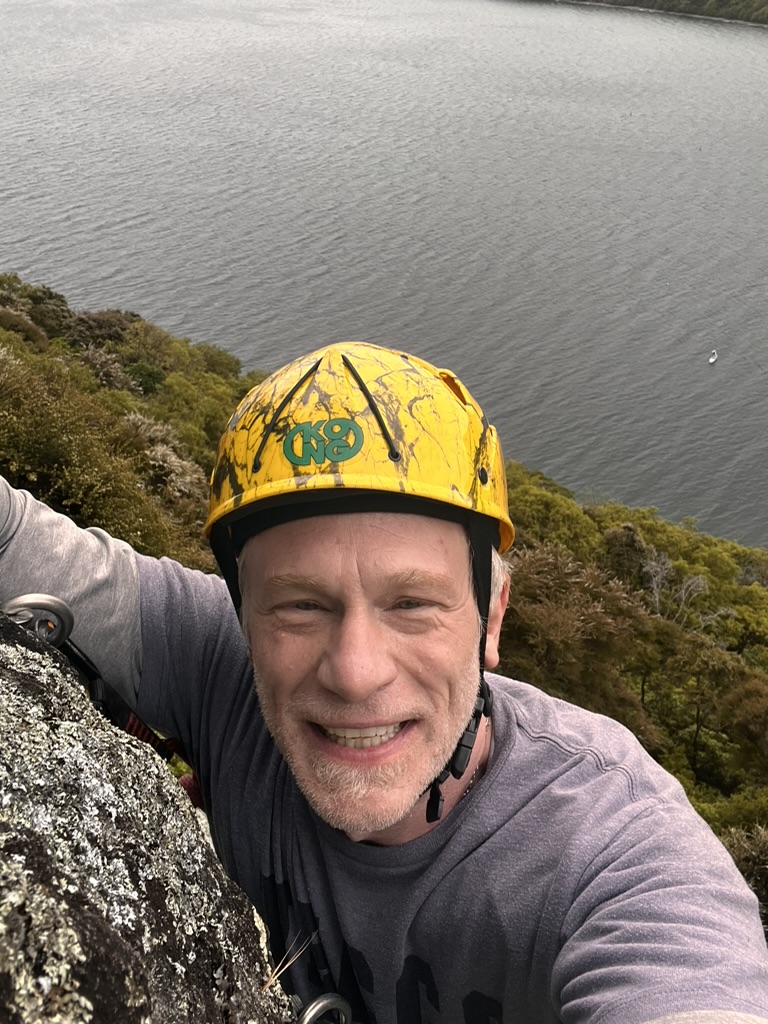
Dr Søren Boysen
Le Dr Søren Boysen a obtenu son DVM en 1996 du Western College of Veterinary Medicine, a effectué un internat en 1998 au Atlantic Veterinary College, et par la suite complété un programme de résidence en urgentologie et soins critiques, animaux de compagnie (ECC) à Tufts University au Massachussetts, avant d’obtenir sa certification en 2003 comme Diplomate du American College of Veterinary Emergency and Critical Care.
Après un emploi comme responsable de l’unité d’urgentologie et de soins critiques à l’Université de Montréal, il occupe présentement un poste de professeur titulaire en ECC Animaux de compagnie, University of Calgary. Bien qu'il aime tout ce qui concerne l'ECC vétérinaire, il est un véritable passionné d'échographie au point de service (POCUS), ayant introduit POCUS dans la profession vétérinaire pour petits animaux en 1999!
Le conseil du Dr Boysen aux étudiants est le suivant : « Devenir un médecin vétérinaire à succès n’est pas un processus de 4 ans d’apprentissage, c’est un cheminement d’une vie. Le parcours est beaucoup plus facile si vous trouvez quelque chose que vous aimez et qui vous passionne; trouvez quelque chose que vous aimez! J’aime l’urgentologie et les soins critiques vétérinaires ainsi que l’échographie au point de service, deux choses qui n’existaient pas quand j’étais étudiant vétérinaire, mais d’une certaine façon, nous nous sommes trouvés, et maintenant je sillonne le monde pour les enseigner. Donc, soyez ouverts à de nouvelles idées et défis, ils pourraient ouvrir des avenues à un tout nouveau monde que vous n’auriez jamais imaginé. Ne craignez pas de commettre des erreurs. L’échec n’est pas une note que l’on donne; c’est la première tentative de l’apprentissage, et il est vaut mieux échouer et apprendre que de ne jamais essayer. Finalement, et le plus important de tout, ayez du plaisir – on ne vit qu’une fois ! »
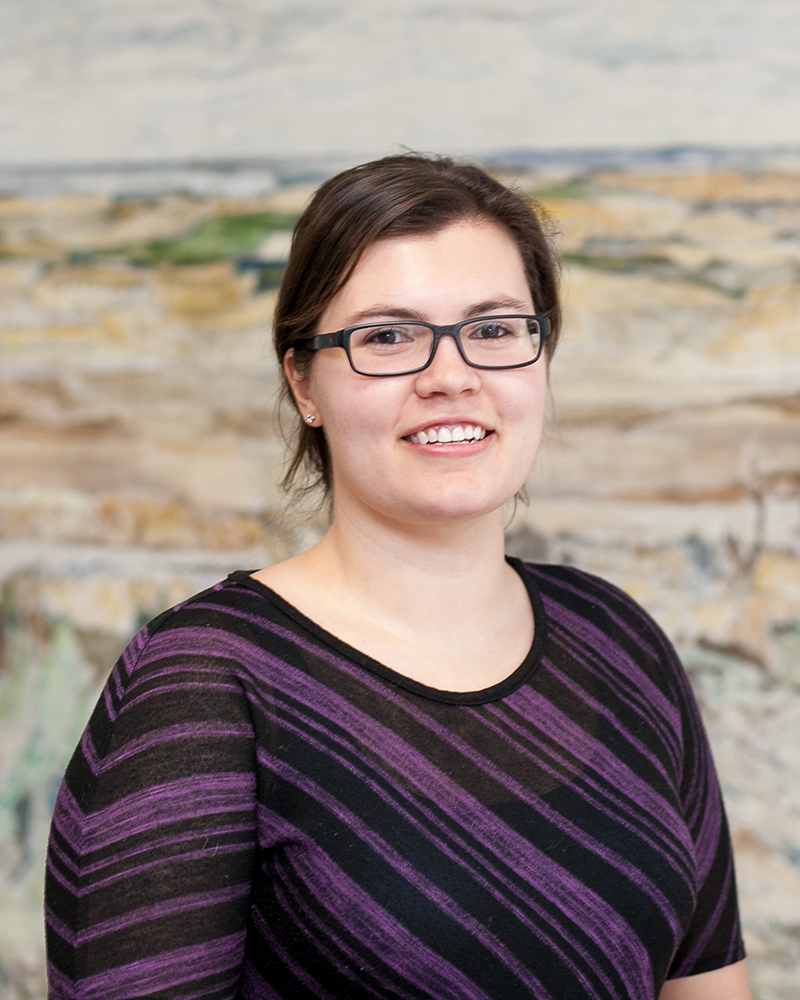
Dre Jen Loewen
La Dre Jen Loewen est professeure adjointe de soins intensifs et de médecine d’urgence des petits animaux au Western College of Veterinary Medicine (WCVM).
La Dre Loewen a grandi à Winnipeg, au Manitoba. Elle a obtenu son diplôme du WCVM, et a ensuite effectué un internat en rotation en médecine et chirurgie des petits animaux à l’Université d’État de l’Iowa et une résidence en médecine d’urgence et soins intensifs pour petits animaux à l’Université du Wisconsin à Madison. La Dre Loewen a obtenu sa certification de spécialiste de l’American College of Veterinary Emergency and Critical Care en 2018. Elle fait actuellement une maîtrise en éducation des professionnels de la santé.
En tant que seule spécialiste en médecine d’urgence et en soins intensifs au Veterinary Medical Centre du WCVM, la Dre Loewen supervise et encadre les étudiants en médecine vétérinaire durant leur formation clinique. Elle donne également une partie du cours de médecine et de chirurgie des petits animaux de troisième année, et elle a créé un cours optionnel de troisième année sur la médecine d’urgence et les soins intensifs afin de développer davantage le programme d’urgentologie du WCVM. En plus d’enseigner aux étudiants en médecine vétérinaire, la Dre Loewen apporte son soutien aux internes et à l’équipe de TSA qui travaillent au centre d’urgence et à l’unité des soins intensifs.
Le conseil de la Dre Loewen aux étudiants est le suivant : « Continuez à être curieux et à demander pourquoi – cherchez comment chaque chose que vous apprenez dans les différents cours peut être un morceau du casse-tête pour les patients que vous traiterez à l’avenir si vous vous dirigez vers la pratique clinique. Profitez du soutien offert pendant vos études pour prendre des risques et vivre des expériences qui vous sortent de votre zone de confort et qui vous font grandir ! »
Le Prix du praticien des petits animaux de l’ACMV, commandité par Petsecure assurance maladie pour animaux de compagnie, est décerné à un membre de l’ACMV dont le travail en pratique des petits animaux, en recherche clinique ou en sciences fondamentales représente une contribution importante à l’avancement de la médecine ou de la chirurgie des petits animaux ou à la gestion d’une pratique pour petits animaux. Les récipiendaires reçoivent une bourse de 1000 $.
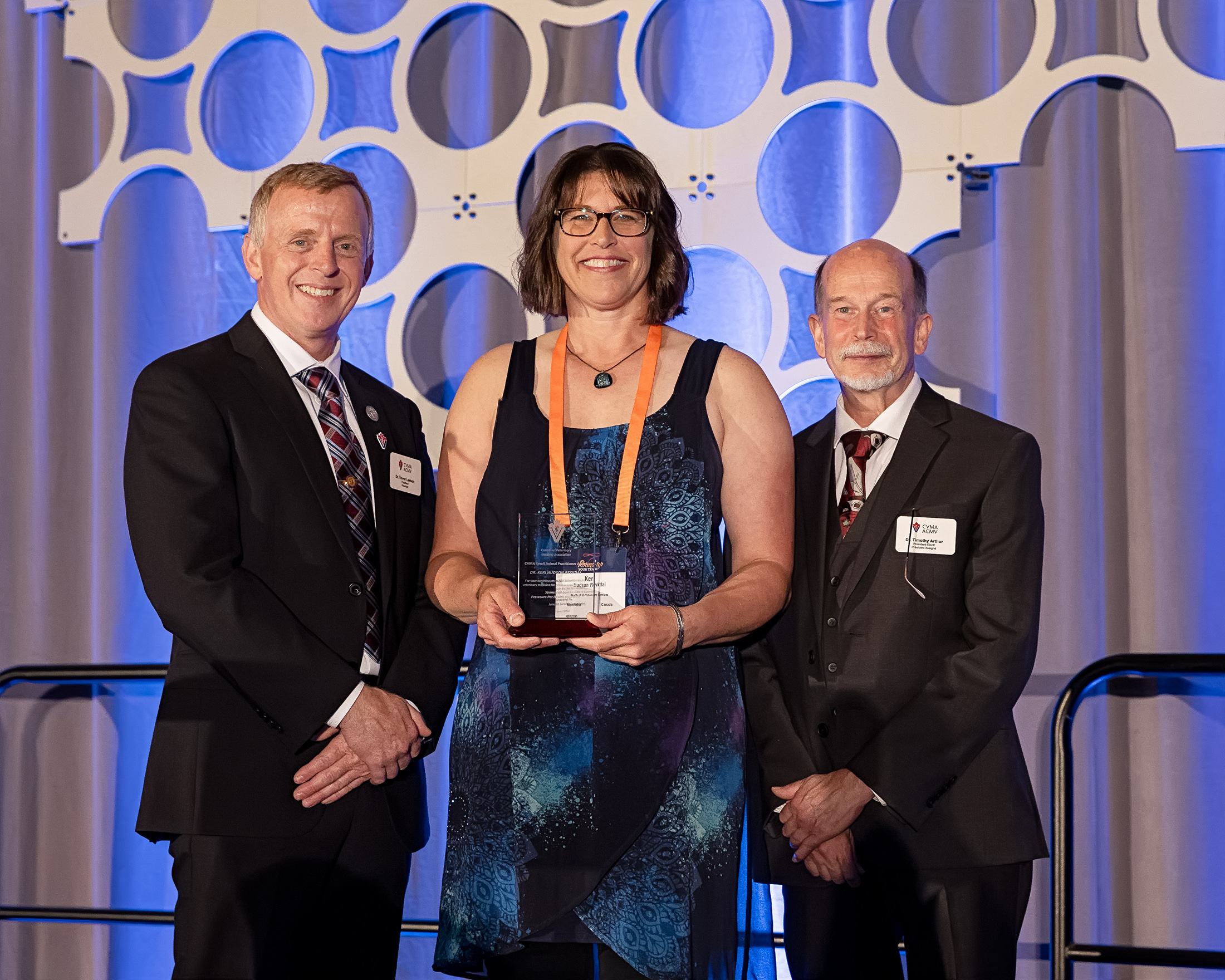
Récipiendaire de 2024 :
Dre Keri Hudson Reykdal

La Dre Keri Hudson Reykdal a obtenu son doctorat en médecine vétérinaire du Western College of Veterinary Medicine. Pendant 20 ans, elle a travaillé en solo comme praticienne rurale mixte à Ashern, au Manitoba. Elle s'est rendue dans de nombreuses communautés des Premières Nations avec le premier hôpital vétérinaire mobile du Manitoba, assurant des services de stérilisation et de vaccination pour les communautés mal desservies. Au cours de sa quête d'une nouvelle direction, la ville de Thompson, au Manitoba, s'est soudainement retrouvée sans services vétérinaires. Elle a fourni des services temporaires à la communauté du Nord et a construit peu après une nouvelle clinique vétérinaire alors que le besoin de services vétérinaires était énorme. Elle a siégé au conseil de la Manitoba Veterinary Medical Association de 2020 à 2023. Pendant ses temps libres, elle passe du temps à pêcher avec son mari et à faire de la randonnée avec ses bergers australiens.
Le Prix vétérinaire Merck, créé en 1985 et parrainé par Merck Santé animale, est remis à un membre de l’ACMV dont le travail en pratique des grands animaux, en recherche clinique ou en sciences fondamentales a contribué de manière importante à l’avancement de la médecine et de la chirurgie des grands animaux, y compris la régie de la santé des troupeaux. Les récipiendaires reçoivent une bourse de 1000 $.
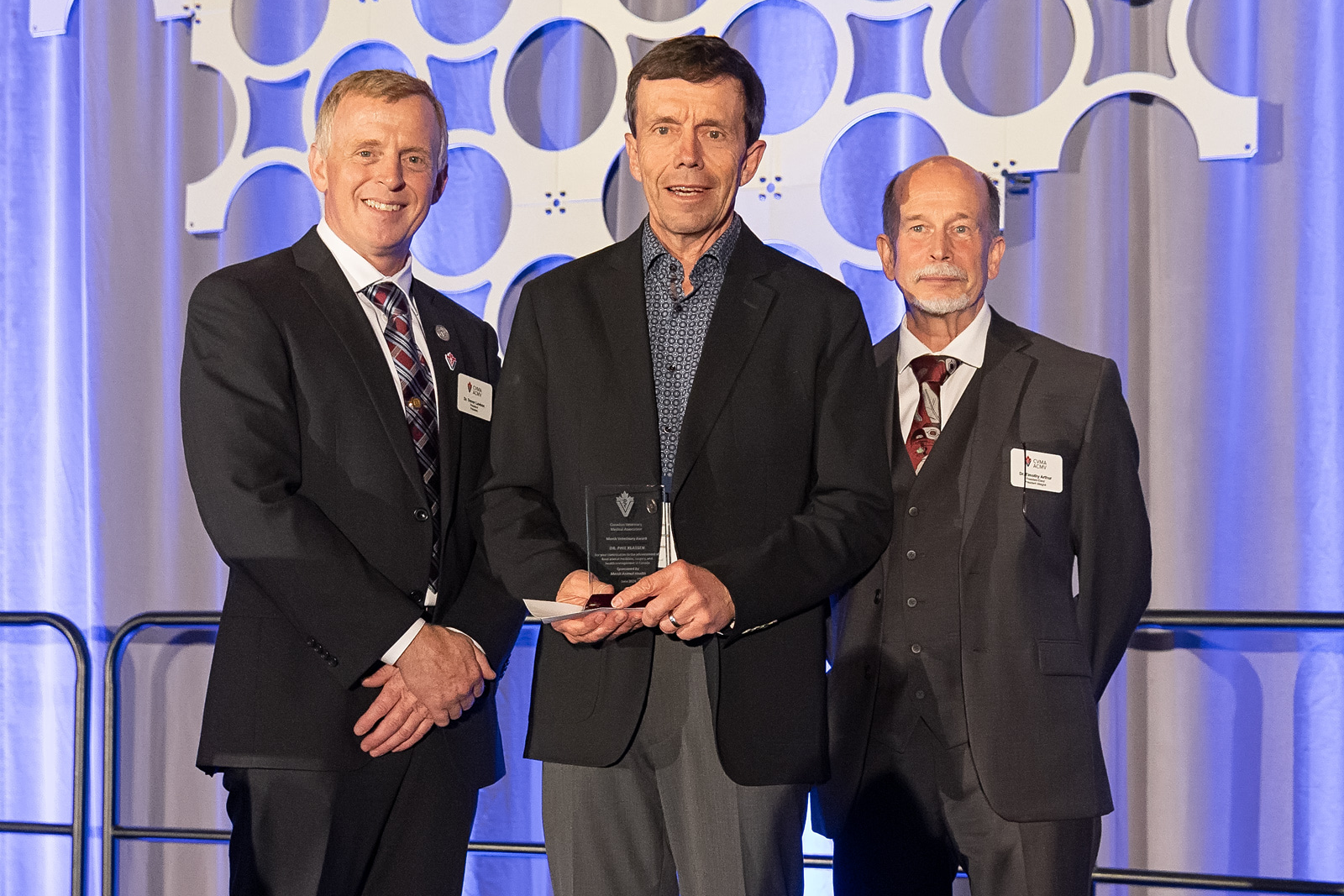
Récipiendaire de 2024 :
Dre Phil Klassen

Le Dr Phil Klassen est diplômé du Western College of Veterinary Medicine en 1982. Il est vétérinaire chez Cattle Health Management, basé à Coaldale, en Alberta, et fournit des services de consultation vétérinaire aux clients des parcs d'engraissement du sud de l'Alberta. Son champ de pratique comprend une liste complète de services vétérinaires offerts au secteur des parcs d'engraissement avec un intérêt particulier pour la santé et le suivi de la production bovine, le bien-être des animaux, la réalisation d'études cliniques et la formation des clients et du personnel. En 2007, il a reçu le prix du vétérinaire de l’année de la Western Canadian Association of Bovine Practitioners et en 2024, un prix de membre à vie. Il aime la vie à la ferme avec sa femme Elaine avec qui il consacre du temps à la randonnée en montagne et au ski de fond.
Le Prix R.V.L. Walker, institué en 1986, comporte une plaque et une bourse. Le prix est remis à deux récipiendaires: la plaque est présentée annuellement au président du comité étudiant de l’Association canadienne des médecins vétérinaires (CEACMV) en reconnaissance de ses contributions à la promotion de l’intérêt des étudiants a l’égard de l’ACMV; la bourse est remise au collège où est inscrit le président du CEACMV et est attribuée à un étudiant vétérinaire dans le besoin. Le choix du récipiendaire de la bourse est fait par le comité pertinent selon les politiques établies par le collège. Si le collège n’a aucun comité chargé de choisir les récipiendaires de l’aide financière, le doyen pourra choisir l’étudiant.
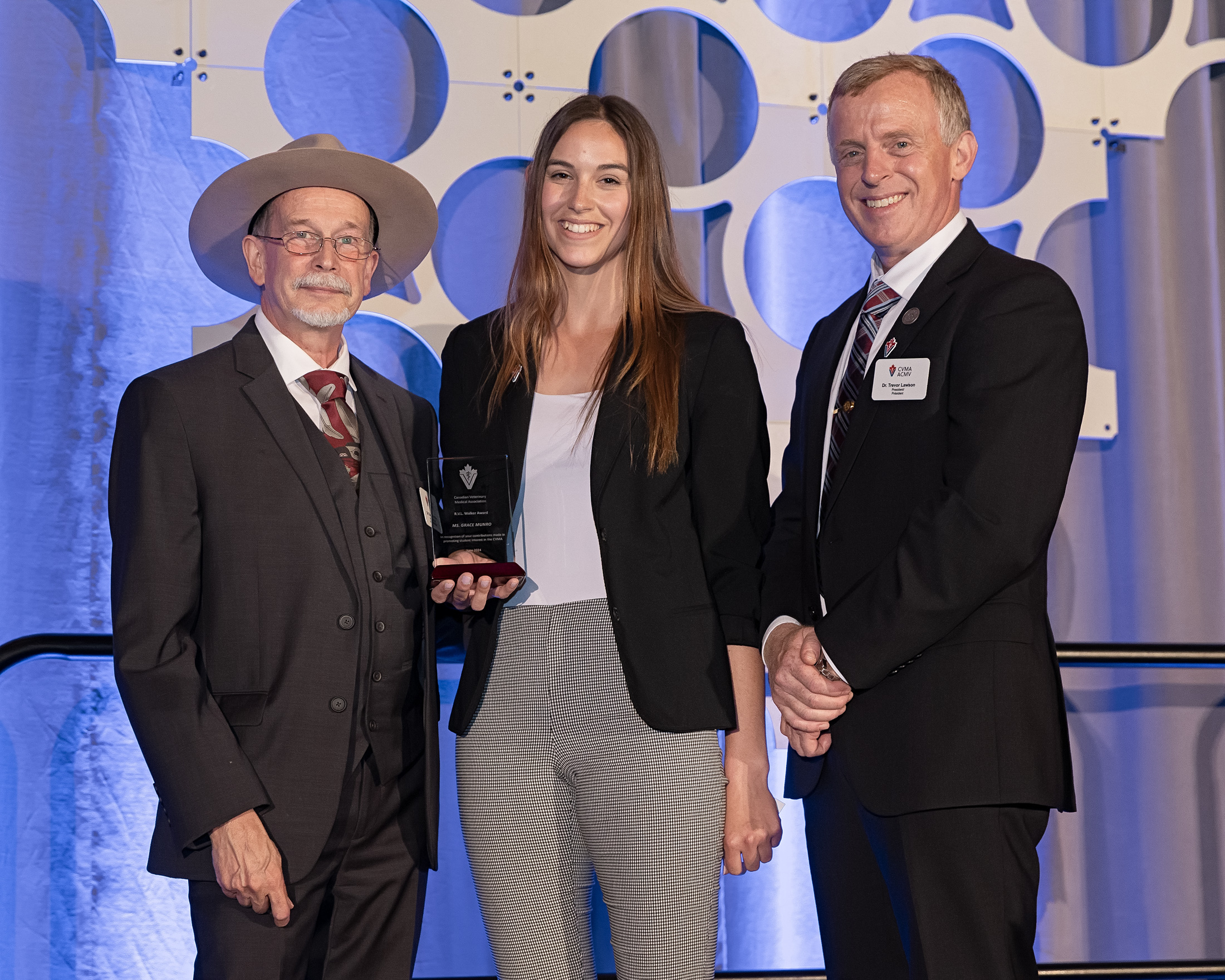
Récipiendaire de 2024 :
Mme. Grace Munro
Grace Munro est étudiante en deuxième année de médecine vétérinaire au Atlantic Veterinary College et a grandi dans la vallée de l'Annapolis, en Nouvelle-Écosse, dans une ferme d'agrément. Elle a été très active dans la communauté équestre, en particulier dans le circuit des concours de chasse et de saut d’obstacles, pendant la majeure partie de sa vie. Entre son implication équestre et son expérience professionnelle en tant qu'assistante vétérinaire, elle a développé un intérêt pour la médecine équine. Elle a complété un baccalauréat ès sciences en biologie à l’Université Acadia avant de poursuivre son rêve d’enfance de fréquenter une école vétérinaire. Au cours de ses études de premier cycle, elle a fait du bénévolat et a travaillé dans divers cabinets vétérinaires pour petits et grands animaux et a passé deux étés à travailler en recherche à Agriculture et Agroalimentaire Canada. Elle travaille actuellement à l’hôpital pour les grands animaux à AVC où elle aime acquérir une expérience pratique au cours des années précliniques du programme de DVM.
En 2017, l’ACMV a créé le Prix du leadership étudiant à l’étranger de l’ACMV. Ce prix consiste en une plaque et un prix en argent de 2000 $ cdn; il est remis annuellement à un étudiant de troisème année membre affilié de l’ACMV inscrit dans une école de médecine vétérinaire à l’extérieur du Canada participant au programme d'affiliation pour étudiants à l’étranger de l’ACMV.
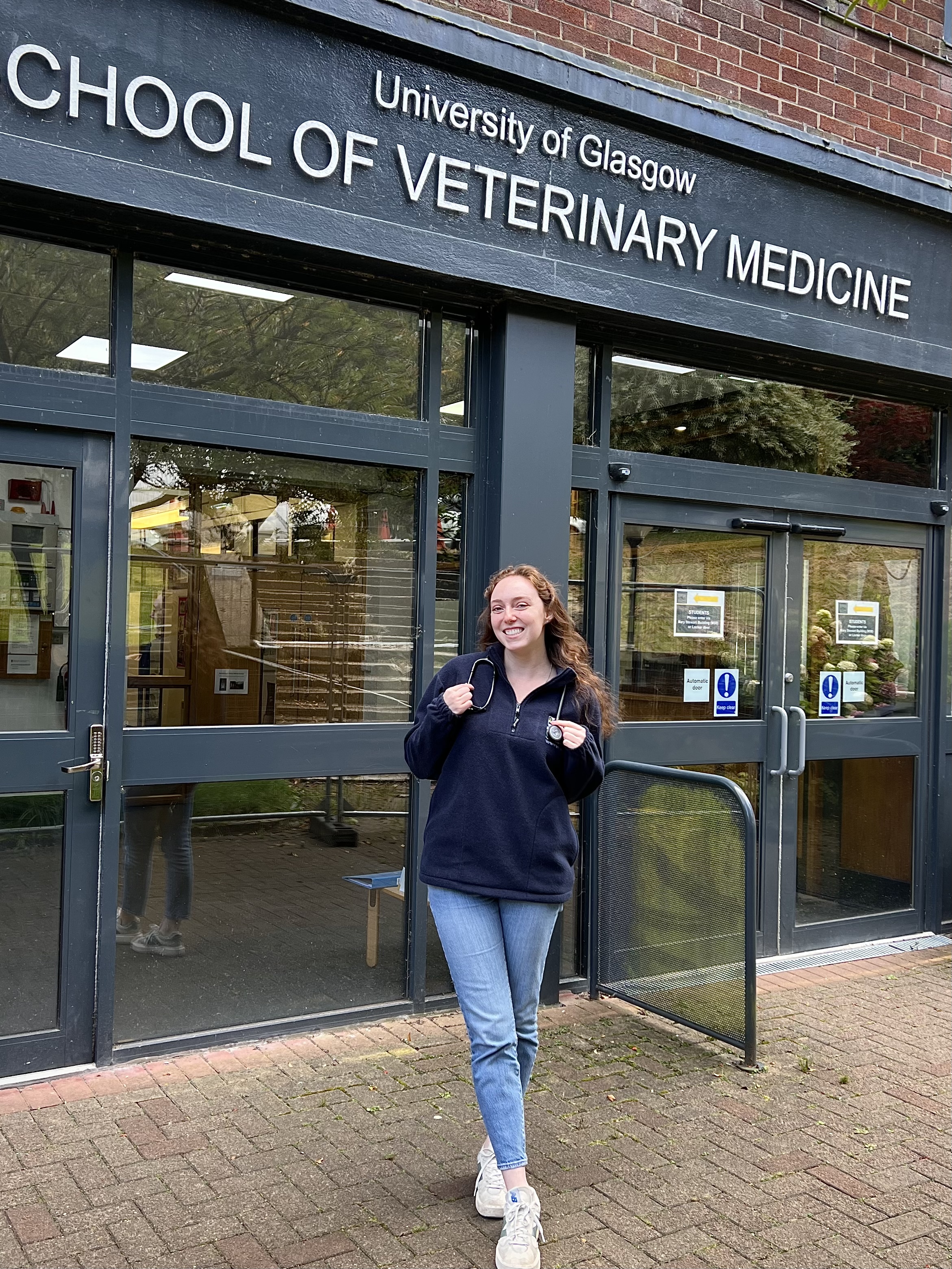
Récipiendaire de 2025 :
Alicea Grace
Alicea Grace est étudiante en troisième année de médecine vétérinaire à l’Université de Glasgow, en Écosse.
Originaire d’Ottawa, en Ontario, elle a obtenu un diplôme en biologie animale et microbiologie à l’Université de Guelph. Après six ans à Guelph, elle a décidé de poursuivre ses études vétérinaires à l’étranger, attirée par les opportunités académiques et culturelles uniques offertes par le Royaume-Uni.
Depuis son arrivée à Glasgow, Alicea s’est investie avec enthousiasme dans la vie étudiante. Dès sa première année, elle s’est impliquée dans la section étudiante de l’Association canadienne des médecins vétérinaires (ACMV) de sa faculté. Elle a également contribué à l’association étudiante de médecine vétérinaire (GUVMA), participé au programme de mentorat étudiant « Big Vet Wee Vet », et été ambassadrice étudiante de la Veterinary Public Health Association (VPHA) au sein de la One Health Society de l’Université de Glasgow (GUOHS).
Alicea adore créer des liens, organiser des événements éducatifs et motivants, et aider ses camarades étudiants canadiens à se sentir chez eux pendant leurs études à l’étranger.
Quand elle obtiendra son diplôme dans deux ans, Alicea prévoit retourner en Ontario pour exercer la médecine vétérinaire en pratique des animaux de compagnie. Elle espère continuer de guider et d’appuyer les étudiants en médecine vétérinaire d’aujourd’hui et de demain, et jouer un rôle important dans la formation de la prochaine génération de professionnels vétérinaires.
 Skip to main content
Skip to main content